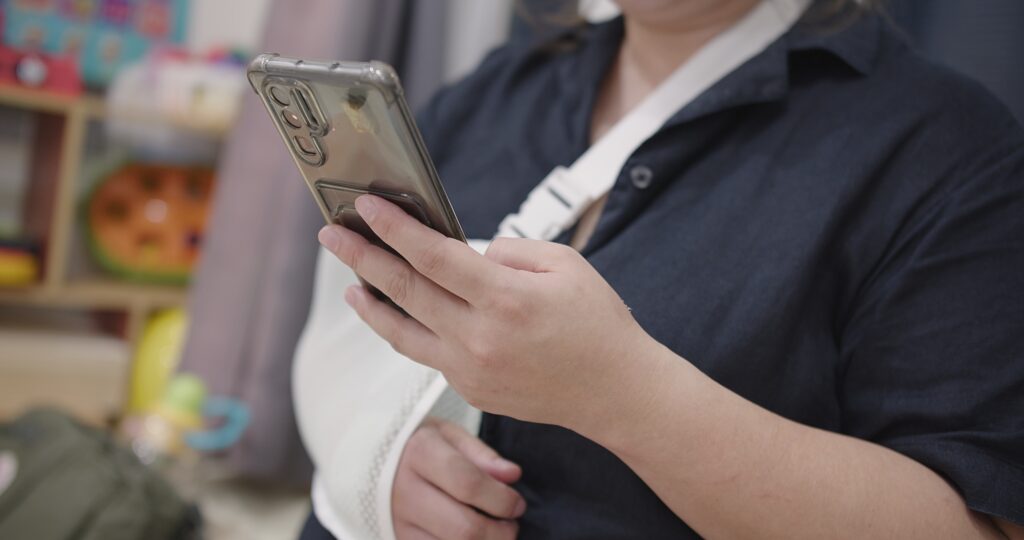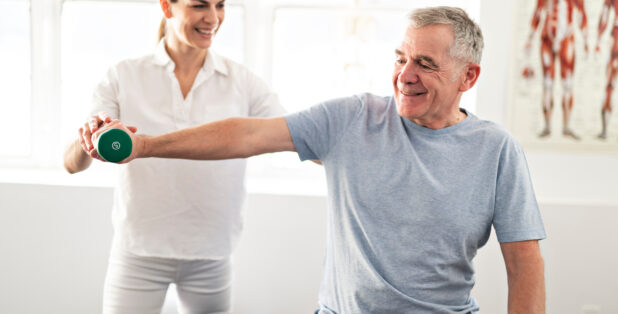As you get older, rotator cuff tears become increasingly common – occurring in 25% of patients over 65 and 50% of patients over 80. Rotator cuff tears, which occur in the area of the shoulder that helps move and rotate the upper arm, can be very painful and disruptive to your daily life. While some minor tears can be healed through physical therapy, many require surgery.
The good news about rotator cuff surgery is that most procedures can be performed on an outpatient basis. That means you can arrive for your surgery and go home to recover the same day. However, even with a minimally invasive outpatient procedure, it’s important to carefully follow post-surgery instructions from your care team.
Here’s an overview of what to expect immediately and in the months after your surgery:

What should I anticipate on Rotator Cuff Surgery Day and early on during recovery?
The majority of rotator cuff repairs are performed as an outpatient procedure with a minimally invasive shoulder arthroscopy approach. During surgery, damaged tissue is removed, and rotator cuff tendons are reattached to bone using suture anchors. After your surgery, you can expect to return home that same day. General anesthesia and sometimes also nerve block anesthesia are commonly used during shoulder surgeries. As the anesthesia wears off, you will likely experience pain and discomfort as part of the natural healing process. However, your doctors can assist with prescribing medication for pain management if necessary. Your arm will be kept in a sling for about 4-6 weeks following your surgery to support healing of the soft tissues. According to Healthline, your doctors will likely encourage you to move around soon after surgery in order to prevent the formation of blood clots.
What can my friends and family help with?
For the first 6 to 12 weeks after surgery, you won’t be able to lift anything – especially not overhead. Also, depending on your doctor’s orders, you may not be able to drive for a few weeks following surgery. To help you with everyday tasks and to provide transportation, it’s a good idea to line up “helpers” ahead of time. Consider carpooling to work with a co-worker or allowing extra time in the mornings so your family can help you get ready for the day.
How long will it take me to recover?
Although you may be quick to return home after rotator cuff surgery, the recovery process can take anywhere from 4-6 months and may require physical therapy. It can take at least 6-8 weeks for the tendon to heal to the bone. Moving your arm again will progress in stages – your physical therapist (PT) will start by helping you work on your range of motion by gently moving your arm again. From there, once it’s safe to do so, your PT will begin working with you on strengthening exercises.
When can I return to my favorite activities?
It’s important to always check with your doctor first, but you may be able to return to some activities about 10-12 weeks after your surgery. However, participation in more rigorous sports may be restricted by your doctor. You may also need to avoid activities that require excessive overhead lifting, which may cause a repeat rotator cuff injury.
What if I feel better right away after surgery?
Patience is a virtue, especially when it comes to repairing a torn or damaged rotator cuff! It’s important to remember that healing takes time, even if you feel physically ready to return to your favorite activities. It’s important to follow the detailed recovery instructions provided by your surgeon.
Review our shoulder solutions here or connect with a surgeon using our Find a Doctor tool to learn more.




